We may earn revenue from the products available on this page and participate in affiliate programs. Learn more ›
It’s no exaggeration to say that every year dozens of DIYers and hobbyists lose their sight permanently because they tackled a quick job without reaching for their safety glasses. US Bureau of Labour statistics tell us there are around 20,000 workplace eye injuries per year, and who knows how many accidents at home. Many are minor, but some are life-changing. Yet according to the American Academy of Ophthalmologists, 90% of these could be prevented with easy-to-use protective eyewear. Affordable protective eyewear. There is simply no excuse not to own a pair, so here are the best safety glasses on the market right now.
Best overall: 3M Virtua CCS Safety Glasses
Best splurge: Oakley M Frame Industrial Glasses
Best polarized: Kleenguard V30 Nemesis Polarized Safety Glasses
Best prescription: DeWalt DPG59-115C Reinforcer Rx-Bifocal Safety Glasses
Best over glasses: NoCry Safety Glasses Over Eyeglasses
Best budget: Radians Mirage Safety Glasses
How we chose the best safety glasses
I’m an engineer by trade and ran my own pro woodshop for 11 years. I’m also an enthusiastic DIYer and amateur home mechanic. I understand the importance of good protective eyewear, and have worn most of the safety glasses, goggles, and face shield styles available while working with saws, sanders, grinders, and more.
To supplement my experience, the team and I researched materials, performance options, and extras offered by the leading brands. We looked at comfort, a must for those wearing safety glasses all day. Price played a part, of course, and we tried to find solutions for all budgets. We also checked whether each pair met national safety standards. Finally, we reviewed buyer feedback from several retail sources to understand how our top picks fared in day-to-day use.
The best safety glasses: Reviews & Recommendations
The following picks provide a detailed description of each model to help potential buyers find the right safety glasses for a wide range of tasks and budgets. The result is a carefully collated selection that offers everything from the best value safety glasses to specialist military-grade eyewear.
Best overall: 3M Virtua CCS Safety Glasses
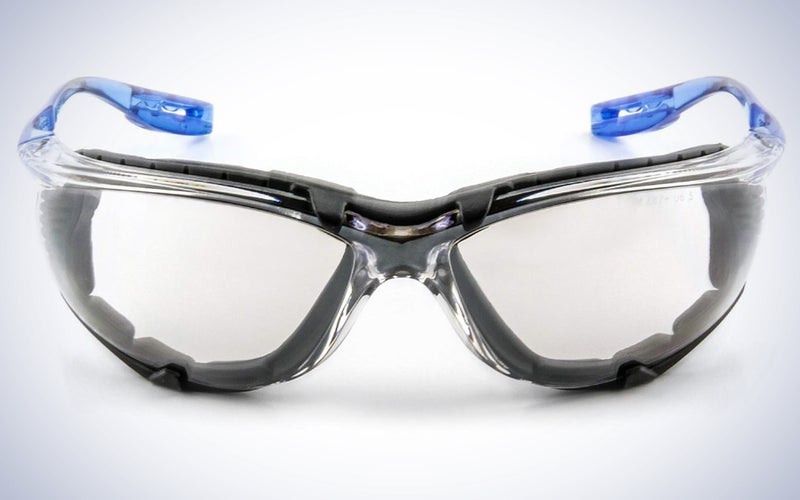
Specs
Protection Standard: ANSI Z87.1, CSA Z94.3
UV Blocking: 99.9% UVA, UVB & UVC (200 – 380 nm)
Lens Treatments: Anti-Scratch, Anti-Fog
Lens Options: Indoor/Outdoor Mirror, Clear, or Gray
Pros
Hugely popular with a host of practical features at a competitive price
Removable foam gasket increases protection from nuisance dust and splashes
Control system for corded earplugs, allowing them to double as a lanyard
Cons
Complaints are rare, but a few found the anti-fog coating ineffective
It wasn’t easy to pick a single pair as our overall best safety glasses, but if you’re looking for affordable eye protection with a comprehensive feature set, it’s tough to beat these from 3M.
Lenses are polycarbonate and meet both US and Canadian protection standards. The unisex wrap-around design offers extended side coverage, and contoured arms provide a snug, comfortable fit. An anti-scratch and anti-fog coating has been applied. There is a choice of lens color: clear provides maximum visual acuity and color recognition, I/O mirror lenses are intended for those who frequently transition from indoors to outdoors, and gray lenses perform well outdoors in both cloudy and sunny conditions.
An unusual feature of the 3M Virtua CCS safety glasses is the removable foam gasket. This works similarly to protective goggles to keep out dust and splashes but without the added size and weight. They also have a unique clip at the end of the arms for those who wear corded earplugs. It secures them with the glasses and utilizes the cord as a lanyard.
Best splurge: Oakley M Frame Industrial Glasses

Specs
Protection Standard: ANSI Z78.1, MIL PRF-31013
UV Blocking: 100% UVA & UVB
Lens Treatments: Anti-Scratch, Anti-Fog
Lens Options: Clear, Persimmon, Gray
Pros
Unique Plutonite lens material offers military-grade ballistic impact protection
Hydrophilic nose pad provides a secure fit even when wet
In the event of damage or wear only the lenses need be replaced
Cons
Considering the high price, we would have expected a case
Important to buy from reputable source to avoid fakes
Lenses are made from Oakley’s own polycarbonate-based material called Plutonite. It meets both ANSI Z78.1 and MIL PRF-31013; the latter is a US military standard for ballistic impact protection capable of stopping a 0.15 caliber projectile traveling at 640 feet per second (roughly 436 mph). Oakley safety lenses also use Polaric Ellipsoid Technology for superb optical clarity without distortion at all viewing angles. The three tint choices offer optimum transmittance in different lighting conditions, and lens changing is possible without tools.
Frame and nose pad are made from another proprietary material called Hydrophilic Unobtainium, which maintains a secure fit even when wet. The M Frame design is compatible with a variety of protective helmets, auditory over-ear protection, and helmet-mounted night vision systems.
Not surprisingly, the Oakley M Frame Industrial Glasses do require a significant investment. Confusingly, a few retailers describe them as men’s safety glasses, though most state unisex, so they are equally suitable as safety glasses for women.
Best polarized: Kleenguard V30 Nemesis Polarized Safety Glasses
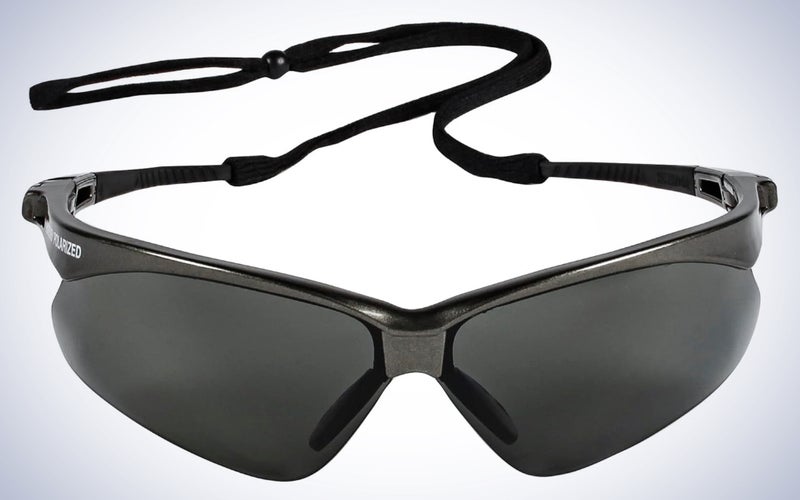
Specs
Protection Standard: ANSI Z87.1
UV Blocking: 99.9% UVA, UVB & UVC
Lens Treatments: Anti-Scratch
Lens Options: Smoke only
Pros
Meets the internationally recognized EN 1836 4.1.4.2 standard for polarized lenses
Patented FLEX-DRY frame channels sweat away from eyes
Convenient adjustable lanyard included
Cons
A few buyers have had problems with nose piece discomfort
No anti-fog coating
Polarized lenses reduce glare and help sharpen images. This makes seeing what you’re doing in bright sunlight easier, particularly when detail is involved. Safety glasses that incorporate these benefits are, therefore, a very good idea for those who spend a lot of time working outside. The V30 Nemesis from Kleenguard is an affordable, unisex model with a contemporary design. In addition to polarization to the internationally recognized EN 1836 4.1.4.2 standard, they also offer high levels of UV filtering and an anti-scratch coating for added durability.
Lenses have a curvature that provides extended peripheral protection. Kleenguard V30 Nemesis safety glasses also incorporate the patented FLEX-DRY system that directs sweat away from the eyes and nose, helping prevent discomfort and stopping the glasses from slipping. Soft pads on the arms are another comfort feature, and there is also a useful removable lanyard.
We discovered that polarized lenses could be tinted or clear when we looked into the best smart glasses, so it’s something of a surprise to find the Kleenguard V30 Nemesis polarized safety glasses are only available in smoke.
Best prescription: DeWalt DPG59-115C Reinforcer Rx-Bifocal Safety Glasses
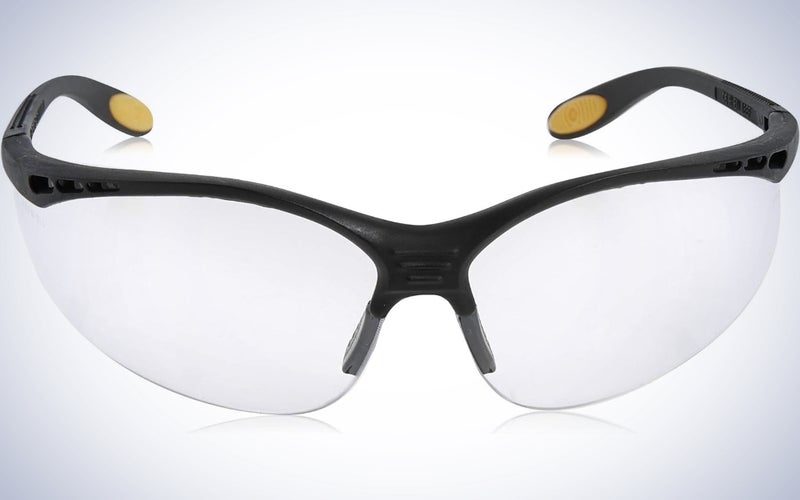
Specs
Protection Standard: ANSI Z87.1
UV Blocking: 99.9% UVA & UVB
Lens Treatments: Anti-Scratch
Lens Options: Clear
Pros
Bifocal safety glasses from one of the world’s leading power tool brands
Choose from diopter 1.0, 1.5, 2.0 or 3.0
Cushioned rubber temple pads for comfort
Cons
A few found flaws in the clarity of the non-diopter portion
No anti-fog coating
Prescription eyewear is a must for some, but custom safety glasses can be expensive. DeWalt’s Reinforcer Rx-Bifocals are a competitively-priced alternative. While the upper portion of the lens has no prescription, the lower corners have optically adjusted sections molded in. These are available with diopters of 1.0, 1.5, 2.0, and 3.0, thus offering workable solutions for many.
DeWalt is probably best known as one of the world’s leading power tool brands. So it’s no surprise the company offers an extensive range of tough, hard-wearing safety glasses. These feature a non-slip rubber nosepiece that self-adjusts for secure fit and soft temple pads for added grip and comfort.
While the hard coat lens is very durable, all safety glasses will wear or scratch eventually. Lenses on the DeWalt Reinforcer Rx-Bifocals are replaceable. However, several people found it awkward and suggested simply buying another pair.
Best over glasses: NoCry Safety Glasses Over Eyeglasses
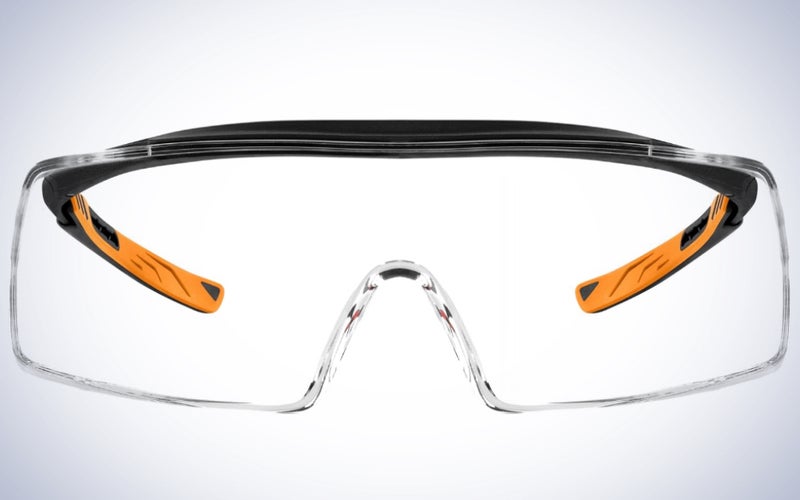
Specs
Protection Standard: ANSI 87.1, CSA Z94.3
UV Blocking: 90 – 100% UVA, UVB & UVC
Lens Treatments: Anti-Scratch
Lens Options: Clear, Orange, Gray
Pros
Allow the user to wear their existing corrective glasses
Provide similar coverage as goggles without the bulk
Adjustable arms for custom fit and high comfort
Cons
One size, so may not fit over all glasses
Poor fit can cause scratching
For those who wear corrective eyewear, the standard safety solution is protective goggles. However, while these can be highly effective they tend to be bulky and comparatively heavy. NoCry Over Eyeglasses are designed to fit over most standard frames and will be the ideal alternative for many. They offer similar levels of coverage while usually being lighter.
The polycarbonate lenses meet the same standards as other safety glasses and, according to the manufacturer, are also approved by the US OSHA (Occupational Safety and Health Administration). Arms are adjustable so users can find the perfect fit. They also incorporate soft pads for grip and comfort. Options with clear, orange, and gray lenses are available to suit different indoor and outdoor applications.
Only one size is available, so it’s important to check measurements to ensure they will cover your existing eyewear. While not particularly expensive, the NoCry Over Eyeglasses safety glasses cost more than the DeWalt bifocals. However, the latter doesn’t offer the same degree of precision as individual prescriptions.
Best budget: Radians Mirage Safety Glasses
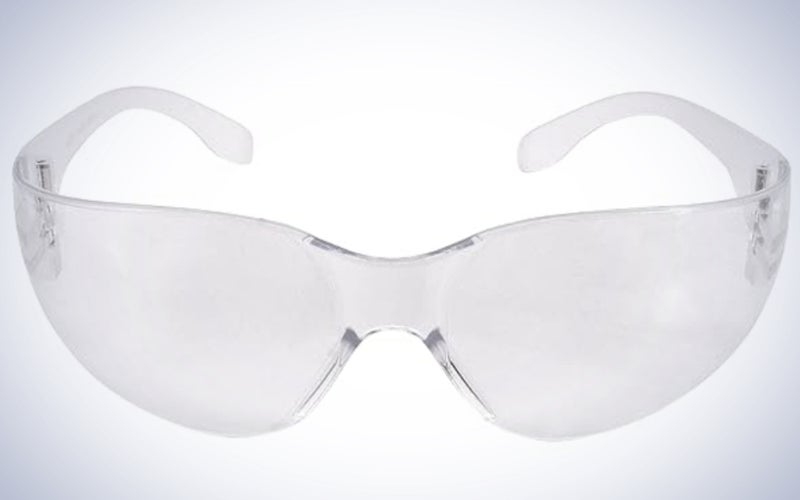
Specs
Protection Standard: ANSI Z87.1
UV Blocking: 99.9% UVA & UVB
Lens Treatments: Anti-Fog (optional)
Lens Options: Clear, Amber, Light Blue, I/O, Rainbow Mirror, Silver Mirror, Smoke
Pros
They deliver all the necessary protection at very affordable prices
Lens contour provides a surprisingly good orbital seal
Available in a wide range of lens options to suit indoor and outdoor working
Cons
Lightweight, but no other comfort features
They scratch relatively easily
Radians Mirage safety glasses come with such a low price tag everyone should be able to afford proper, standards-compliant, protective eyewear. While they have fewer features than many rivals, the lightweight design means they can be worn for extended periods without discomfort.
Lenses are polycarbonate and are optically correct. They have a contour defined as 9.75 that provides near-perfect orbital coverage. They also offer 99.9% protection against UVA and UVB rays. The temple area is particularly wide, helping to defend against side impacts.
The range of lens colors is extensive, and most come with or without anti-fog coating. This gives the option to reduce costs further. It’s important to note that the blue-tinted safety glasses from the Radians Mirage range are intended to reduce glare and should not be confused with blue light glasses that we discuss here. The only real downside is that there is no anti-scratch coating, so lenses can be damaged relatively easily. Fortunately, the cost of replacements is modest.
There are many decisions to make regarding the best safety glasses for you. We considered the following most important when conducting research for this guide:
Safety features
The American National Standard for safety glasses is ANSI Z87.1, and this number should be marked on the lens or frame. Certification specifies levels of protection from impact, dust, liquid splashes, infrared, and UV rays. The equivalent standard used in Canada is CSA Z94.3, and in Europe is EN-166 1F. Even the cheapest safety glasses sold in the US should meet the ANSI standard.
Some high-end safety glasses have MILSPEC certification, which meets US military standards—specifically MIL PRF-31013 and MIL-PRF-32432. This is generally termed ballistic eyewear and offers considerably greater impact protection. MILSPEC safety glasses must also have changeable lenses.
Comfort & durability
If your safety glasses aren’t comfortable, you will be reluctant to wear them. Low-cost safety glasses tend to be lightweight, thus reducing pressure on the bridge of the nose, which is a common problem area. Higher-priced pairs often provide rubberized pads in this area.
Temples, the side of the head, and ears are other areas where a poor fit can give discomfort, so the arms of safety glasses are often curved or contoured to avoid rubbing. As with the nose, soft pads may be added. The arms are adjustable for better fit on some of the most comfortable safety glasses.
Durability can be difficult to assess. An anti-scratch coating is always a good idea, though some cheap safety glasses don’t have them. Plastics used for the frame and arms will usually survive being dropped from time to time. Also check the hinges. It’s nice to have a case or cover, but these are often not included.
Lens materials & treatments
Virtually all lenses in safety glasses are made of polycarbonate, technically a thermoplastic polymer. One common use that illustrates the impact resistance of this material is in the manufacture of motorcycle helmets. It can also be made with optical clarity that is good enough for prescription eyeglasses.
One drawback with polycarbonate is that it is prone to scratching, so a scratch-resistant coating is usually applied. Anti-fog coatings are another popular addition. Most safety glasses also offer good UV protection through the 280 to 400 nanometer (nm) wavelengths that cover UVA, UVB. Some also offer limited protection against UVC (100 to 280 nm, normally only found in artificial light). Lenses are frequently tinted for increased performance in different light conditions or to suit personal preference. Polarized lenses are another option that reduce glare, and can reduce eyestrain. It’s also possible to buy safety glasses with prescription and bifocal lenses.
FAQs
Q: Are safety glasses or goggles better?
It’s not really a question of whether safety glasses or goggles are better but rather which best meets your needs in terms of protection and comfort. Safety glasses tend to be lighter and are easier to put on and take off. Protective goggles may provide a better seal around the eyes in dusty environments and are sometimes paired with respiratory protection. They are often recommended when there’s a risk of chemical splashes. However, some people find them too bulky, resulting in a reluctance to use them.
Q: When should safety glasses be worn?
There’s never a wrong time to wear safety glasses. Something as apparently innocent as a paint splash or a little sawdust can cause irritation that lasts hours or even days. Keep safety glasses in or near your tool kit, and put them on for every DIY task or hobby activity that involves flying debris or liquids: sawing, drilling, soldering, glass cutting, etc.
Q: Are expensive safety glasses worth it?
Whether expensive safety glasses are worth it largely depends on the type of protection required. While some expensive safety glasses are as much about style as practicality, others may have higher impact ratings than budget models. It is always worth making sure the specification of the safety glasses you buy exceeds the intended purpose.
Q: How long do safety glasses last?
Generally speaking, safety glasses will last between 3 and 5 years. However, if you wear prescription safety glasses, you must change them if your prescription alters. Of course, they should be changed immediately if they get damaged. Regularly using a good glasses cleaner will help remove dust and debris and prolong their useful life.
Final thoughts on the best safety glasses
Best overall: 3M Virtua CCS Safety Glasses
Best budget: Radians Mirage Safety Glasses
Best splurge: Oakley M Frame Industrial Glasses
Best polarized: Kleenguard V30 Nemesis Polarized Safety Glasses
Best prescription: DeWalt DPG59-115C Reinforcer Rx-Bifocal Safety Glasses
Best over glasses: NoCry Safety Glasses Over Eyeglasses
Safety glasses are obligatory in many workplaces but are easy for DIYers and hobbyists to overlook. Yet loss of eyesight through accidents at home can often be permanent, and what seems like a simple 5-minute job could result in blindness. So the question is not whether you should buy protective eyewear but which pair will suit you best. Our research proves that safety glasses are available for all budgets, and even polarized and bifocal options are very affordable.
Why trust us
Popular Science started writing about technology more than 150 years ago. There was no such thing as “gadget writing” when we published our first issue in 1872, but if there was, our mission to demystify the world of innovation for everyday readers means we would have been all over it. Here in the present, PopSci is fully committed to helping readers navigate the increasingly intimidating array of devices on the market right now.
Our writers and editors have combined decades of experience covering and reviewing consumer electronics. We each have our own obsessive specialties—from high-end audio to video games to cameras and beyond—but when we’re reviewing devices outside of our immediate wheelhouses, we do our best to seek out trustworthy voices and opinions to help guide people to the very best recommendations. We know we don’t know everything, but we’re excited to live through the analysis paralysis that internet shopping can spur so readers don’t have to.
>>> Read full article>>>
Copyright for syndicated content belongs to the linked Source : Popular Science – https://www.popsci.com/gear/best-safety-glasses/










